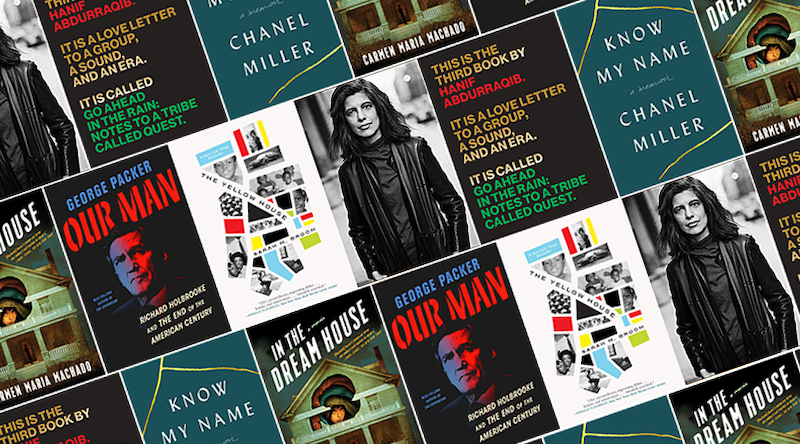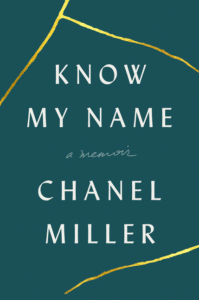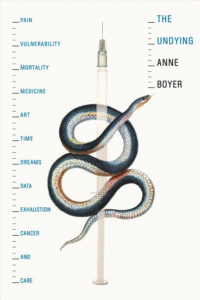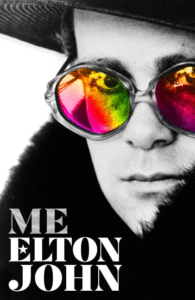
We’ve come to the end of another year in reading, folks, and as stewards of this venerable repository of literary criticism, it is once again our sacred duty to dust off the abacuses (abaci?) and tabulate the best reviewed books of past twelve months.
Yes, using reviews drawn from more than 150 publications, over the next two weeks we’ll be revealing the most critically-acclaimed books of 2019, in the categories of (deep breath): Memoir & Biography, Sci-Fi & Fantasy, Essay Collections, Short Story Collections, Graphic Literature, Literature in Translation, Mystery & Crime, Poetry, General Fiction, and General Nonfiction.
First out of the gate: Memoir and Biography.
1. In the Dream House by Carmen Maria Machado
24 Rave • 11 Positive
“What could seem gimmicky—I confess I braced myself at first—quickly feels like the only natural way to tell the story of a couple. What relationship exists in purely one genre? What life? … a hive of frenetic experimentation, tactics and tricks … There is something anxious, and very intriguing, in the degree of experimentation in this memoir, in its elaborately titivated sentences, its thicket of citations. The flurry—the excess—feels deliberate, and summons up the image of the writer holding a ring of keys, trying each of them in turn to unlock a resistant story, to open a door she might be hesitant to enter … written into the silence surrounding violence in queer relationships, the silences around emotional and psychological abuse … a living archive of her own loving, idiosyncratic design.”
–Parul Sehgal (The New York Times)
2. The Yellow House by Sarah M. Broom
16 Rave • 10 Positive
“…[an] extraordinary, engrossing debut … Broom…pushes past the baseline expectations of memoir as a genre to create an entertaining and inventive amalgamation of literary forms. Part oral history, part urban history, part celebration of a bygone way of life, The Yellow House is a full indictment of the greed, discrimination, indifference and poor city planning that led her family’s home to be wiped off the map. It is an instantly essential text, examining the past, present and possible future of the city of New Orleans, and of America writ large … Broom is our guide, but not the sort who holds readers’ hands, uninterested as she is in tidy transitions between one type of writing and another. The through line is her thought process, her frequent questioning … The interviews also yield unforgettable scenes … The true test of her worthiness is her empathy and focused attention. She is a responsible historian, granting her subjects the grace of multiple examinations over the years … Broom’s deadpan humor comes through clearest in her descriptions of herself … The Yellow House is a book that triumphs much as a jazz parade does: by coming loose when necessary, its parts sashaying independently down the street, but righting itself just in the nick of time, and teaching you a new way of enjoying it in the process.”
–Angela Flournoy (The New York Times Book Review)

3. Know My Name by Chanel Miller
16 Rave • 3 Positive
“… the product of rigorous writerly attention … If Know My Name had been shaped in these slicker forms—a corrective, a tell-all—readers sympathetic to Miller would have readily received her rage, whatever her tone. But Miller situates victimhood as a conduit to expertise, and trauma as a mode of human insight … Miller is a gifted storyteller who establishes her authority by stacking details, setting scenes … she observes her own ordeal by adopting the stance of a reporter, a media critic, and an activism-minded theorist. She is heartbreakingly resourceful, marshalling her subjectivity as evidence of a system set up to protect the potential of a boy like Turner … contains a forceful critique of the complicity of liberal institutions like Stanford, which seem more afraid of upsetting sensibilities than they are concerned with doing right by survivors like Miller … Miller’s writing début may have been precipitated by her assault, but the final work devitalizes its horrific beginnings. No narrative is as persuasive as Miller’s. There is no more self-effacing sobriety, no more conclusions plastering confusion and fury. Know her name, know her voice.”
–Doreen St. Félix (The New Yorker)

4. The Undying by Anne Boyer
16 Rave • 2 Positive
“…a rousing hybrid of memoir and manifesto … It’s…incandescent rage that animates The Undying, and situates it alongside current literature on feminist anger…as well as recent illness memoirs…critical of a medical establishment that frequently refuses to take women’s concerns seriously and punishes non-compliance … Not long ago, publishers assumed readers wanted whitewashed, upbeat stories about breast cancer, and the market was flooded with cutesy, cringe-inducing titles, like Big C Little Ta-Ta, Let Me Get This Off My Chest and Killer Boobs. Boyer’s intervention into this genre feels like crossing the Rubicon … This is memoir as anti-capitalist indictment, as biting cultural criticism, as vengeance. It suggests a new era in the politics of breast cancer, one that might look less like corporate sponsored marathons every October and more like the radical, confrontational AIDS activism of the 1980s. Arriving the year before an election that could set healthcare and disability policy for decades, The Undying warns us of the human costs of any system that prioritizes profit over lives.”
–Sascha Cohen (NPR)

5. Me by Elton John
12 Rave • 4 Positive
“… outrageously enjoyable … That he has celebrity anecdotes to burn is not a surprise. But the self-mocking tone is more unexpected from a musician so grand that at his 2014 wedding party he had one table dedicated solely to the Beatles and their families. Yet while his extraordinary talent justified his personal excesses, it is his self-awareness that has counterbalanced the narcissism and made him such a likable figure … It quickly becomes clear in Me that few people are more suited to the celebrity autobiography genre, given that he combines the most essential ingredients of the form … makes sure there is a laugh out loud moment on pretty much every other page. This gives a pacy originality to what could have been a by-the-numbers celebrity … credit really must go to Elton, whose extremely amusing voice very much drives the book … [John] is utterly, astonishingly, hilariously self-lacerating … his clear-eyed honesty and his ear for the comic line make him a deeply appealing memoirist.”
–Hadley Freeman (The Guardian)
1. Our Man: Richard Holbroke and the End of the American Century by George Packer
15 Rave • 4 Positive • 3 Mixed • 1 Pan
“I doubt that any novel, not even one co-written by Graham Greene and F. Scott Fitzgerald, could have captured Holbrooke fully, and I certainly thought that no biography ever would. But now one has. George Packer’s Our Man portrays Holbrooke in all of his endearing and exasperating self-willed glory: relentless, ambitious, voracious, brilliant, idealistic, noble, needy and containing multitudes. It’s both a sweeping diplomatic history and a Shakespearean tragicomedy, with Holbrooke strutting and fretting his hour on the stage … the book overflows with the trait that was Holbrooke’s saving grace: an in-your-face intellectual honesty that is not tainted, as Holbrooke’s was, by his manipulativeness. The result is so bracing that Our Man not only revitalizes but in some ways reinvents the art of journalistic biography.”
–Walter Isaacson (The New York Times Book Review)
2. L.E.L.: The Lost Life and Scandalous Death of Letitia Elizabeth Landon, the Celebrated “Female Byron” by Lucasta Miller
8 Rave • 13 Positive • 2 Mixed
“Landon’s story now takes on elements of a psychological thriller, as well as an unsettling resonance in these days of Me Too. Miller is a brilliant explicator of the troubled trail of fact and fiction that biography leaves in its wake … This long, fraught entanglement with her subject gives Miller’s biography its intricate fascination. It is scholarly, passionate, and angry … produces a devastating picture of the competitive subculture of literary London in the 1820s and 1830s … thanks to Lucasta Miller’s fierce and enthralling book, a complex kind of justice has been rendered to L.E.L. for the first time.”
–Richard Holmes (The New York Review of Books)
3. Go Ahead in the Rain : Notes to A Tribe Called Quest by Hanif Abdurraqib
11 Rave • 7 Positive
“Riveting and poetic … Adburraqib’s gift is his ability to flip from a wide angle to a zoom with ease. He is a five-tool writer, slipping out of the timeline to deliver vivid, memoiristic splashes as well as letters he’s crafted to directly address the central players, dead and living. He is a grown man, a cultural critic, an Important Voice, but he’s also an awkward kid huddled in the back seat of the school bus, that ‘Beats, Rhymes and Life’ cassette wearing out his Walkman. He brings everything to the game, whether a cosmic vignette about Leonard Cohen or an unexpected curveball that somehow morphs into connective tissue … The beauty of being both a true fan and a professional is that you can embrace even the low points and yet analyze with pinpoint accuracy when your heroes have fallen short. And as you search for the perfect ending, you’ll realize there seldom is one.”
–Geoff Edgers (The Washington Post)
4. Sontag: Her Life and Work by Benjamin Moser
8 Rave • 10 Positive • 10 Mixed • 2 Pan
“One of the many fascinating dimensions of Sontag is its scrupulous attention to Sontag’s futile struggle to reconcile mind and body. Even at 700 pages, the book is utterly riveting and consistently insightful, in no small part because of its faithful attention to nuance … The great ambition of Moser’s book is its willingness to organize itself around guiding ideas rather than simply the chronology of events. Or rather, all of these events illuminate the structuring tensions of Sontag’s life … Moser continually peels away the mythology of Sontag—as a single-name icon—to reveal the beating heart of a mortal woman underneath. The book takes this larger-than-life intellectual powerhouse and makes her life-size again … By framing Sontag’s intellectual project within the landscape of her personal experience—bringing her cancer and her queerness and her fragility back into the picture—Moser honors Sontag’s intellectual legacy not just by arguing with her claims but by arguing with her mode—by wondering what additional layers of meaning her work might hold when it’s brought back into conversation with her personal experience.”
–Leslie Jamison (The New Republic)

5. A Woman of No Importance: The Untold Story of the American Spy Who Helped Win World War II by Sonia Purnell
8 Rave • 7 Positive
“Purnell’s account of Hall’s hectic, amphetamine-fuelled exploits never falters. It recalls Caroline Moorehead’s wonderful book, Village of Secrets, about defiance of the Nazis in Vichy France, but has an added touch of Ben Macintyre’s brio … tells a redacted life. The erasures owe as much to Hall’s secretive and mystifying nature as to official censorship so it is a marvel that Purnell, who has previously written biographies of Boris Johnson and Clementine Churchill, has discovered so much. It is a pleasure to read a biography in which the author admires her subject so warmly. This might so easily have been a pernickety, fact-finding book, but instead it is a rousing tale of derring-do. Men, women and tomboys will all enjoy the courage and initiative of Virginia Hall.”
–Mick Herron (The New York Times Book Review)
*
Our System: RAVE = 5 points • POSITIVE = 3 points • MIXED = 1 point • PAN = -5 points
If you buy books linked on our site, Lit Hub may earn a commission from Bookshop.org, whose fees support independent bookstores.

